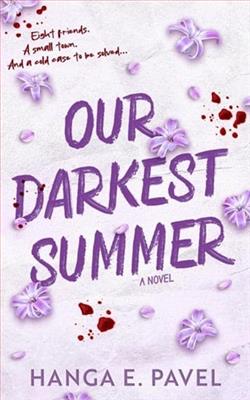Page 2 of High Heat (Jack Reacher 17.5)
“Or nearby. Or the Bowery. There’s music all over, right?”
“Same thing. All his territory.”
“Who is he?”
“His name is Croselli. Everything north of Houston and south of 14th is his. And you hit him in the head.”
“He’s one guy. He won’t find me.”
“He’s a made man. He has soldiers.”
“How many?”
“A dozen, maybe.”
“Not enough. Too big of an area.”
“He’ll put the word out. All the clubs and all the bars.”
“Really? He’ll tell people he’s frightened of a sixteen-year-old? I don’t think so.”
“He doesn’t need to give a reason. And people will bust a gut to help. They all want brownie points in the bank. You wouldn’t last five minutes. Go see your brother. I’m serious.”
“Free country,” Reacher said. “That’s what you’re working for, right? I’ll go where I want. I came a long way.”
The woman stayed quiet for a long moment.
“Well, I warned you,” she said. “I can’t do more than that.”
And she walked away, toward Washington Square. Reacher waited where he was, all alone on Waverly, head up, head down, searching for a breath of air, and then he followed after her, about two minutes behind, and he saw her drive away in a car that had been parked in a tow zone. A 1975 Ford Granada, he thought, mid-blue, vinyl roof, a big toothy grille. It took a corner like a land yacht and drove out of sight.
Washington Square was much emptier than Reacher had expected. Because of the heat. There were a couple of unexplained black guys hanging around, probably dealers, and not much else. No chess players, no dog walkers. But way over on the eastern edge of the square he saw three girls go into a coffee shop. Coeds for sure, long hair, tan, lithe, maybe two or three years older than him. He headed in their direction, and looked for a pay phone on the way. He found a working instrument on his fourth try. He used a hot damp coin from his pocket and dialed the number he had memorized for West Point’s main switchboard.
A sing-song male voice said, “United States Military Academy, how may I direct your call?”
“Cadet Joe Reacher, please.”
“Hold the line,” the voice said, which Reacher thought was appropriate. West Point was in the business of holding the line, against all kinds of things, including enemies foreign and domestic, and progress, sometimes. West Point was Army, which was an unusual choice for the elder son of a Marine, but Joe’s heart had been set on it. And he claimed to be enjoying it so far. Reacher himself had no idea where he would go. NYU, possibly, with women. The three in the coffee shop had looked pretty good. But he didn’t make plans. Sixteen years in the Corps had cured him of that.
The phone clicked and buzzed as the call was transferred from station to station. Reacher took another hot wet coin from his pocket and held it ready. It was a quarter to nine, and dark, and getting hotter, if such a thing was possible. Fifth Avenue was a long narrow canyon running north ahead of him. There were flashes of light in the sky, low down on the horizon, way far in the distance.
A different voice said, “Cadet Reacher is currently unavailable. Do you have a message?”
Reacher said, “Please tell him his brother is delayed twenty-four hours. I’m spending the night in the city. I’ll see him tomorrow evening.”
“Roger that,” the new voice said, with no interest at all, and the line went dead. Reacher put the second coin back in his pocket, and he hung up the phone, and he headed for the coffee shop on the eastern edge of the square.
* * *
An air conditioner over the coffee shop’s door was running so hard it was trembling and rattling, but it wasn’t making much difference to the temperature of the air. The girls were together in a booth for four, with tall soda glasses full of Coke and melting ice. Two of them were blondes and one was a brunette. All of them had long smooth limbs and perfect white teeth. The brunette was in short shorts and a sleeveless button-front shirt, and the blondes were in short summer dresses. They all looked quick and intelligent and full of energy. Storybook Americans, literally. Reacher had seen girls just like them in greasy old out-of-date copies of Time and Life and Newsweek, at Mujuk and every other base he had lived on. They were the future, the stories had said. He had admired them from afar.
Now he stood at the door under the roaring air conditioner and admired them from a whole lot closer. But he had no idea what to do next. Life as a Corps kid taught a guy plenty, but absolutely nothing about bridging a fifteen-foot door-to-table distance in a New York City coffee shop. Up to that point his few conquests had not really been conquests at all, but mutual experiments with Corps girls just as isolated as himself, and just as willing and enthusiastic and desperate. Their only negatives had been their fathers, who were all trained killers with fairly traditional views. The three students in front of him were a whole different can of worms. Much easier from the parental point of view, presumably, but much harder in every other way.
He paused.
Nothing ventured, nothing gained.
He moved on, fifteen feet, and he approached their table, and he said, “Do you mind if I join you?”
They all looked up. They all looked surprised. They were all too polite to tell him to get lost. They were all too smart to tell him to sit down. New York City, in the summer of 1977. The Bronx, burning. Hundreds of homicides. The Son of Sam. Irrational panic everywhere.
He said, “I’m new here. I was wondering if you could tell me where to go, to hear some good music.”
No answer. Two pairs of blue eyes, one pair of brown, looking up at him.
He said, “Are you headed somewhere this evening?”
The brunette was the first to speak.
She said, “Maybe.”
“Where to?”
“Don’t know yet.”
A waitress came by, barely older than the coeds themselves, and Reacher maneuvered himself into a spot where her approach gave him no choice but to sit down. As if he had been swept along. The brunette scooted over and left an inch between her thigh and his. The vinyl bench was sticky with heat. He ordered a Coke. It was way too hot for coffee.
There was an awkward silence. The waitress brought Reacher’s Coke. He took a sip. The blonde directly opposite asked him, “Are you at NYU?”
“I’m still in high school,” he said.
She softened a little, as if he was a rare curiosity.
“Where?” she asked.
“South Korea,” he said. “Military family.”
“Fascist,” she said. “Get lost.”
“What does your dad do for a living?”
“He’s a lawyer.”
“Get lost yourself.”
The brunette laughed. She was an inch shorter than the others, and her skin was a shade darker. She was slender. Elfin, almost. Reacher had heard the word. Not that it meant much to him. He had never seen an elf.
The brunette said, “The Ramones might be at CBGB. Or Blondie.”
Reacher said, “I’ll go if you go.”
“It’s a rough area.”
“Compared to what? Iwo Jima?”
“Where’s that?”
“It’s an island in the Pacific.”
“Sounds nice. Does it have beaches?”
“Lots of them. What’s your name?”
“Chrissie.”
“Pleased to meet you, Chrissie. My name is Reacher.”
“First or last?”
“Only.”
“You have only one name?”
“That anyone uses.”
“So if I go to CBGB with you, do you promise to stick close by?”
Which was pretty much a do-bears-sleep-in-the-woods type of a question, in Reacher’s opinion. Is the Pope a Catholic? He said, “Sure, count on it.”
The blondes on the opposite side of the table started fidgeting with dubious body language, and immediately Reacher knew they wouldn’t
come too. Which was dead-on A-OK with him. Like a big green light. A one-on-one excursion. Like a real date. Nine o’clock in the evening, Wednesday, July 13th, New York City, and his first civilian conquest was almost upon him, like a runaway train. He could feel it coming, like an earthquake. He wondered where Chrissie’s dorm was. Close by, he guessed.
He sipped his Coke.
Chrissie said, “So let’s go, Reacher.”
* * *
Reacher left money on the table for four Cokes, which he guessed was the gentlemanly thing to do. He followed Chrissie out through the door, and the night heat hit him like a hammer. Chrissie, too. She held her hair away from her shoulders with the backs of her hands and he saw a damp sheen on her neck. She said, “How far is it?”
He said, “You’ve never been?”
“It’s a bad area.”
“I think we have to go east about five blocks. Past Broadway and Lafayette to the Bowery. Then about three blocks south to the corner with Bleecker.”
“It’s so hot.”
“That’s for sure.”
“Maybe we should take my car. For the AC.”
“You have a car?”
“Sure.”
“Here in the city?”
“Right there.” And she pointed, to a small hatchback car on the curb about fifty feet away. A Chevrolet Chevette, Reacher thought, maybe a year old, maybe baby blue, although it was hard to tell under the yellow street lights.
He said, “Doesn’t it cost a lot to keep a car in the city?”
She said, “Parking is free after six o’clock.”
“But what do you do with it in the daytime?”
She paused a beat, as if unraveling the layers of his question, and she said, “No, I don’t live here.”
“I thought you did. Sorry. My mistake. I figured you were at NYU.”
She shook her head and said, “Sarah Lawrence.”
“Who’s she?”
“It’s a college. Where we go. In Yonkers. North of here. Sometimes we drive down and see what’s going on. Sometimes there are NYU boys in that coffee shop.”
“So we’re both out-of-towners.”
“Not tonight,” Chrissie said.
“What are your friends going to do?”
“About what?”
“About getting home tonight.”
“I’m going to drive them,” Chrissie said. “Like always.”
Reacher said nothing.
“But they’ll wait,” Chrissie said. “That’s part of the deal.”
* * *
The Chevette’s air conditioner was about as lousy as the coffee shop’s, but something was better than nothing. There were a few people on Broadway, like ghosts in a ghost town, moving slow, and a few on Lafayette, slower still, and homeless people on the Bowery, waiting for the shelters to open. Chrissie parked two blocks north of the venue, on Great Jones Street, between a car with its front window broken and a car with its back window broken. But it was under a working street light, which looked to be about as good as it got, short of employing a team of armed guards, or a pack of vicious dogs, or both. And the car would have been no safer left on Washington Square, anyway. So they got out into the heat and walked to the corner through air thick enough to eat. The sky was as hot and hard as an iron roof at noontime, and it was still flickering in the north, with the kind of restless energy that promised plenty and delivered nothing.
There was no line at the door of the club, which Chrissie felt was a good thing, because it meant there would be spots to be had at the front near the stage, just in case it really was the Ramones or Blondie that night. A guy inside took their money, and they moved past him into the heat and the noise and the dark, toward the bar, which was a long low space with dim light and sweating walls and red diner stools. There were about thirty people in there, twenty-eight of them kids no older than Chrissie, plus one person Reacher already knew, and another person he was pretty sure he was going to get to know, pretty well and pretty soon. The one he knew was Jill Hemingway, still thin and blonde and nervous, still in her short summer dress. The one he felt he would get to know looked a lot like Croselli. A cousin, maybe. He was the same kind of size and shape and age, and he was wearing the same kind of clothes, which were a sweated-through suit and a shirt plastered tight against a wet and hairy belly.
Jill Hemingway saw Reacher first. But only by a second. She moved off her stool and took a step and immediately the guy in the suit started snapping his fingers and gesturing for the phone. The barkeep dumped the instrument in front of him and the guy started dialing. Hemingway pushed her way through the thin crowd and came up to Reacher face to face and said, “You idiot.”
Reacher said, “Jill, this is my friend Chrissie. Chrissie, this is Jill, who I met earlier this evening. She’s an FBI agent.”
Beside him Chrissie said, “Hi, Jill.”
Hemingway looked temporarily nonplussed and said, “Hi, Chrissie.”
Reacher said, “Are you here for the music?”
Hemingway said, “I’m here because this is one of the few places Croselli doesn’t get total cooperation. Therefore this is one of the few places I knew he would have to put a guy. So I’m here to make sure nothing happens to you.”
“How did you know I would come here?”
“You live in South Korea. What else have you heard of?”
Chrissie said, “What exactly are we talking about?”
Croselli’s guy was still on the phone.
Reacher said, “Let’s sit down.”
Hemingway said, “Let’s not. Let’s get you the hell out of here.”
Chrissie said, “What the hell is going on?”
There were tiny cafe tables near the deserted stage. Reacher pushed through the crowd, left shoulder, right shoulder, and sat down, his back to a corner, most of the room in front of him. Chrissie sat down next to him, hesitant, and Hemingway paced for a second, and then she gave it up and joined them. Chrissie said, “This is really freaking me out, guys. Will someone please tell me what’s going on?”
Reacher said, “I was walking down the street and I saw a guy slap Agent Hemingway in the face.”
“And?”
“I hoped my presence would discourage him from doing it again. He took offense. Turns out he’s a mobster. Jill thinks they’re measuring me for concrete shoes.”
“And you don’t?”
“Seems oversensitive to me.”
Chrissie said, “Reacher, there are whole movies about this stuff.”
Hemingway said, “She’s right. You should listen to her. You don’t know these people. You don’t understand their culture. They won’t let an outsider disrespect them. It’s a matter of pride. It’s how they do business. They won’t rest until they fix it.”
Reacher said, “In other words they’re exactly the same as the Marine Corps. I know how to deal with people like that. I’ve been doing it all my life.”
“How do you plan to deal with them?”
“By making the likely cost too high. Which it already is, frankly. They can’t do anything in here, because they’d be arrested, either by you or the NYPD. Which is too high of a cost. It would mean lawyers and bribes and favors, which they won’t spend on me. I’m not worth it. I’m nobody. Croselli will get over it.”
“You can’t stay in here all night.”
“He already tried it on the street, and he didn’t get very far.”
“Ten minutes from now he’ll have six guys out front.”
“Then I’ll go out the back.”
“He’ll have six guys there too.”
Chrissie said, “You know when I asked you to stick close by me?”















